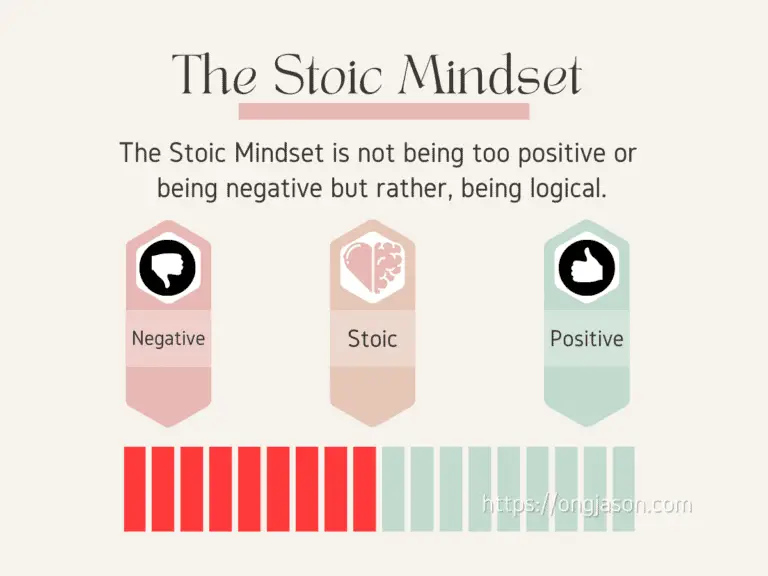What are the Main Ideas of Stoicism | Stoicism in a Nutshell
There are over 2,000 books about Stoicism when you search Amazon. It can be daunting for someone interested in trying or applying the philosophy in their lives. While some books are considered to be the primary resource for Stoicism, such as Meditations by Marcus Aurelius, it can still be hard for people to start Stoicism. Thus, through my years of experience using Stoicism, I will explain the main ideas of Stoicism in one article.
What is Stoicism in simple terms? In simple terms, the main idea of Stoicism is to achieve a happy life or eudaimonia. This is achieved by living a virtuous life with a clean conscience using the four Stoic virtues. Furthermore, Stoics emphasizes controlling what you can only handle to prevent unnecessary stress.
This blog post will introduce you to the ultimate goal of Stoicism and how Stoics achieves this goal. Then, I will summarize the basic concepts of Stoicism into a few steps and introduce you to other Stoic concepts in between these steps.

What are the main points of Stoicism?
Here are the main points of Stoicism:
- Accepting and living according to nature
- Examining the circumstance using the dichotomy of control
- Doing according to the four Stoic virtues
Remember that these points summarize the Stoic principles. These steps are what they believe to be the requirements to achieve what they can Eudaimonia or happy life.
Through my years of practicing the philosophy, I realized that these three points could serve as the summary of Stoicism or the answer to what Stoicism is in a nutshell.
These basic concepts are the main ideas of Stoicism However, as you probably know, there are thousands of books about Stoicism which means these ideas are summarized.
However, I believe that these are enough for people to start applying Stoic principles in their life.
I would also like to add that these main points are arranged in order. Thus, we will also discuss them step-by-step, with the ultimate goal being eudaimonia.
If you want to know more about what the Stoics mean by eudaimonia or living a happy life, you may check my blog post about the topic here: What was the goal of the Stoics?
1. Accepting and Living According to Nature
Everything that happens in a Stoic’s life should be accepted by a Stoic regardless of whether it is good or bad. This is what they say living according to nature.
Some Stoics call this concept Amor fati or if translated in English, means loving one’s fate.
Like most people know about Stoics, Stoics value rational judgment, and they prevent emotion from influencing their actions.
This is done by controlling emotions and not letting them turn into passion.
To make it easier to understand, passion, in a nutshell, is too much emotion. The Stoics believe that too much emotion can harm one’s thinking.
For example, when we are angry, we can irrationally lash out at people around us. This usually leads to regret since we would realize later on that we did something wrong.
Furthermore, this also happens on positive emotions such as happiness. People highly influenced by happiness can make decisions that they could regret later on.
For example, extremely happy people can accept more offers. That’s why it is common practice in marketing or sales to serve or give something to make the customers happy then offer their products.
Stoics prevent this from happening by avoiding passion from influencing their reactions. However, this doesn’t mean that they are emotionless.
Contrary to popular belief, Stoics aren’t emotionless since they know that emotions are embedded into our being. Following the dichotomy of control which we will discuss later, we will see that Stoics aren’t emotionless Rather, they only know how to control their emotions.
But how do Stoics prevent passion? The truth is, they can’t stop passion. There will be times where we will be filled with emotion, and we can’t stop that.
Instead, the Stoics learn what to do when they feel subjected to passion.
What they usually do is to wait and let the emotion subside since emotions are fleeting.
That’s why Stoics tend not to decide when they feel they are subjected to passion. Instead, they wait until they are back to their senses.
One of the famous people who did this is Thomas Jefferson, the third president of the United States.
I made a blog post about Thomas Jefferson’s relationship to Stoicism in this blog post. You may check it here: Is Thomas Jefferson a Stoic?
However, this doesn’t answer what Stoics mean by living in accordance with nature.
As I said earlier, Stoics do their best to be rational. This is done by trying to control their emotions.
The Stoics believe that nature or fate is all-knowing or rational. This means Stoics are deterministic in nature. They believe in fate.
Since nature is rational, accepting nature is rational. So, for example, we shouldn’t complain about the snow because it is part of nature. Likewise, we shouldn’t complain about the rain because it is part of nature.
This is why Stoics accept the things that are happening around them regardless of whether it is good or bad. They believe that nature is rational.
This is also where questions about the philosophy come into place. For example, since Stoics only accept the things that are happening around them, some people see them as deluders and as people who are not trying.
For example, Friedrich Nietzche said that Stoics are self-deluders because of this principle. In another post, I talked about Friedrich Nietzche’s view of Stoicism. You can check it here: What did Nietzche think of Stoicism?
However, I believe in balance. There are times where Stoicism can help especially where things become extremely hard. Rather than resisting, we should instead accept it to live a peaceful and happier life.
To Stoics, accepting one’s fate is an integral part of happiness Rather than trying to battle with fate, we could accept things as a part of life and learn to live with them.
However, this doesn’t apply to all. The Stoics not only accept the situation but examine them. Remember I told you earlier that this is a 3-step process.
Remember that we can’t examine the situation if we don’t accept them. Thus, acceptance is necessary.
Now, let’s go to examining.
If you need a more detailed blog post about the Stoic’s view of nature, I have a separate post about the topic. You may check it here: The Stoic’s life according to Nature.
2. Examining the Circumstance Using the Dichotomy of Control
After accepting the situation, a Stoic examines the circumstance if it is under their control. If the thing is inside their control, they handle or solve it.
If it is not within their control, they learn not to care about it.
One of the main concepts of Stoicism is the dichotomy of control. In fact, this can be one of the most common concepts you’ll hear from an introduction to Stoicism class.
The dichotomy of control simply means that everything around us can be divided into things we can and can’t control.
Stoics only care about the things they can control. This means they don’t or shouldn’t mind the things they can’t control.
Examples of the things outside our control are Fate, Weather, Other People’s Opinion, and Actions.
Examples of things inside our control are our views and actions.
So, when we examine, we should check if the thing is inside our control. If not, we shouldn’t mind them. This is key to living a happier life.
For example, since we can’t control others’ thoughts, we should not care about them rather than stressing ourselves to please everyone.
Rather than stressing about the rain, we should instead find the things we can do, such as preparing some raincoats or waiting for the rain to subside.
This concept is simple, but it is one of the reasons why Stoics tend to be more in control of their life. It’s not that they are better than others. It’s just that they know what to focus on.
If we know what to focus on, we can achieve results.
Another example is when we have exams, rather than complaining about the teacher we can’t control, we can study to at least try having more knowledge for the exams.
A Stoic should always examine the situation. Ask if it is in their control or not. If it is in their power, then they should work on it. If it’s not, then they shouldn’t care about it.
However, if we find out that we can do something about it, what would we do? Do Stoics have a guide on how to handle things we can control? That’s what we will talk about in the next section.
3. Doing according to the Four Stoic Virtues
The Stoics believe that a virtuous life is a key to happiness. That’s why virtues should guide their actions. To be specific, the four Stoic virtues.
In a nutshell, the four Stoic virtues are wisdom, courage, temperance, and justice.
These virtues serve as our guide when interacting with other people or handling the things within our control.
Let me introduce you to each of these virtues.
First, a Stoic should be wise in their judgments.
The main idea here is being rational and not letting our emotions harm our judgments.
We already talked about how emotions harm our actions. A Stoic should be wise enough not to let this happen.
As a guide, remember to let the emotions subside when you are subjected to passion. This would make sure you are acting in wisdom.
Next is courage. A Stoics should be courageous in trying to live virtuously. We should be brave enough to stick with our beliefs.
For example, we should be courageous enough not to harm others simply because it’s not a virtuous way of living.
Furthermore, it is the courage to accept our fate regardless of it seems good or bad. Finally, it is accepting that life can sometimes throw bad things at us.
As we already discussed earlier, learning to accept the things happening around us is better than running away from them. This is courage.
Next is temperance Stoics are virtuous people and don’t let temptations guide their actions.
This means rather than being subjected to temptations, Stoics practice temperance to live a happy life.
For example, they know that Stoics should stay away from empty or even harmful sources of happiness.
This is the practice of temperance.
Lastly, justice.
Are we just in our actions? Are we fair? Are we harming others for our benefit?
These are questions you need to ask to practice justice.
Being just is necessary to achieve harmony with other people. This leads to a harmonious life which is part of what Stoics call Eudaimonia.
To achieve Eudaimonia, a person must act consistently with their nature. However, since we are all different in our natures, we must choose our actions with care.
I am saying this because while the Stoics have a guide called the Four Stoic virtues, we are all different. We have our set of values or virtues which we follow. That’s why knowing ourselves is also necessary.
In conclusion, Stoicism is about living a virtuous life with a clean conscience. One way of doing this is by retaining one’s will and moral integrity, controlling one’s desires, and practicing self-denial. Using these four Stoic virtues, one can live a happy life of eudaimonia.
With all of these, you have the basics of Stoicism. You have an idea of living according to nature, the dichotomy of control, and the four Stoic virtues. This is the summary of Stoicism, and I hope it helps you start Stoicism.
For more posts about Stoicism, feel free to check my blog post here.





![How to avoid poor time management [15 tips]](https://ongjason.com/wp-content/uploads/2021/07/Time-management-2-768x576.jpg)
![How to Be a Hardworking Student [20 Tips]](https://ongjason.com/wp-content/uploads/2021/07/Girl-Studying-768x576.jpg)